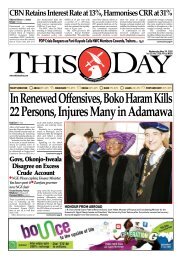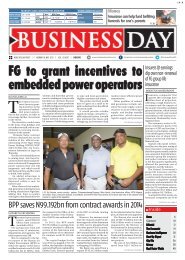Create successful ePaper yourself
Turn your PDF publications into a flip-book with our unique Google optimized e-Paper software.
TUESDAY, APRIL 28, 2015<br />
53<br />
THE NATION<br />
BUSINESS<br />
TRANSPORTATION<br />
Hlong distance trains? It is by<br />
W<br />
E-mail: ynotaderibigbe@gmail.com<br />
Workers, passengers get security tips on trains<br />
OW can workers, passengers<br />
and others be safe on<br />
remaining vigilant to forestall security<br />
threats, say experts, top Department<br />
of State Security (DSS) officials<br />
and police chiefs at a workshop<br />
on security consciousness and<br />
awareness for railway workers and<br />
users in Southwest.<br />
At the training held at the Nigerian<br />
Railway Corporation Training<br />
Institute (NRCTI) in Yaba, Lagos,<br />
last Wednesday, Permanent Secretary,<br />
Special Services Office (SSO)<br />
in the Presidency Dr. Habiba Lawal,<br />
said all hands must be on deck to<br />
fight insurgency.<br />
Mrs Lawal, represented by the<br />
Director in the SSO, Alhaji<br />
Abdullahi Shehu, said the workshop<br />
was organised to ensure that<br />
passengers and Nigerian Railway<br />
Corporation (NRC) workers are<br />
security conscious always.<br />
The workshop, which began last<br />
year, Shehu said, was the seventh<br />
in the series. Similar ones were earlier<br />
held in Bauchi for Northeast,<br />
Jos for Northcentral, Uyo, the<br />
Akwa-Ibom State capital, for the<br />
Southsouth, Enugu State for Southeast<br />
and Ibadan for Southwest.<br />
Shehu said members of the National<br />
Union of Road Transport<br />
Workers (NURTW), transport owners,<br />
employers, students, media,<br />
market men and women, railway<br />
workers and other users of the railway<br />
have been taught the security<br />
precautions to take on the train.<br />
Shehu said the training is part of<br />
the initiative drawn up by the office<br />
of the National Security Adviser<br />
(NSA) to make security on<br />
inter-state train shuttle a collective<br />
responsibility.<br />
He said: “The workshop is meant<br />
to protect all railway stakeholders,<br />
as insecurity is no longer a joking<br />
matter. Security can no longer be<br />
left in the hands of government. It<br />
is your personal responsibility.<br />
There are a lot of things we see as<br />
•From left: Mrs Omotayo; Mr. Alli, Shehu and Director Department of Special Services, Kaze Delson during the workshop.<br />
Stories by Adeyinka Aderibigbe<br />
we travel on the trains that are potential<br />
danger and these must be<br />
promptly reported to pre-empt<br />
them before they consume lives and<br />
property.”<br />
In his welcome address, NRC<br />
Managing Director Mr. Adeseyi<br />
Sijuwade said insurgents’ activities<br />
in some parts of the country made<br />
it imperative for the railway to retrain<br />
its workers and users to be<br />
security conscious to prevent tragedy<br />
on its network.<br />
Sijuwade represented by the Director<br />
of Operations, Mr Niyi Alli,<br />
said as more people use the railway,<br />
it is becoming increasingly<br />
urgent for the corporation to arm<br />
passengers with the right skill<br />
anytime they are on the train, especially<br />
the long distance services.<br />
According to him, government’s<br />
aggressive intervention in the rail<br />
sector since 2011, led to the rehabilitation<br />
of rail lines; improvement<br />
of its rolling stock and reactivation<br />
of the Western and Eastern<br />
rail lines, which, with their active<br />
branch lines, have ensured<br />
that the country is now effectively<br />
covered by rail network.<br />
“Not only are we now carrying<br />
passengers, we now freight agricultural<br />
produce and raw materials<br />
such as flours, wheat and cement<br />
from the Apapa quays to<br />
Kaduna/Kano, as well as carrying<br />
Automobile Gas Oil (AGO) Diesel<br />
and track materials for our operations<br />
nationwide,” Alli said.<br />
He said the NRC carried more<br />
than five million passengers and<br />
200,000 metric tons of goods last<br />
year.<br />
“All these engender security<br />
risk and with the current spate of<br />
insecurity, we cannot leave our<br />
network unprotected. We need to<br />
protect our assets, our personnel<br />
Experts to Buhari: fix Apapa Ports traffic ‘headache’<br />
HAT will gladden the<br />
hearts of transport experts<br />
the most is the fix-<br />
ing of the Apapa Ports traffic<br />
“headache” by the incoming<br />
Muhammadu Buhari administration.<br />
They are also seeking a national<br />
transportation policy, the absence<br />
of which they claim is turning<br />
traffic in the nation’s urban<br />
centres into nightmare.<br />
Leading the charge are Chartered<br />
Institute of Logistics and<br />
Transport (CILT), national president<br />
Maj-Gen. Umar<br />
Tundunwada Usman, Deputy<br />
National President Prof. Kayode<br />
Oyesiku and Federal Airports<br />
Authority of Nigeria (FAAN)<br />
Managing Director Dunoma<br />
Saleh.<br />
They spoke at the induction of<br />
new members, fellows and corporate<br />
members in Ikoyi, Lagos<br />
last week.<br />
Usman, who is also International<br />
Vice President for Africa<br />
and Chairman, African Forum of<br />
Transportation, described the<br />
Apapa Ports situation as a national<br />
embarrassment. He blamed<br />
previous administrations for allowing<br />
the port to decay, that it<br />
has become a major transportation<br />
headache for users and a disincentive<br />
to businesses and entrepreneurship.<br />
He called for a Marshal plan to<br />
tackle the gridlock, adding that<br />
the huge manhour lost daily has<br />
added to the high cost of living<br />
in the country and reduced government’s<br />
revenue generation<br />
capacity.<br />
Usman said: “I would strongly<br />
recommend that the incoming<br />
government addresses the issue<br />
of transportation which is at the<br />
heart of ensuring easier movement<br />
of people from one point to<br />
the other. There is the need for the<br />
government to put in place a<br />
transportation policy which if<br />
put in place, would make other<br />
pieces of our national life to fall<br />
in place. Roads are carrying what<br />
are by far above their carrying<br />
capacity. The railway has not<br />
improved on efficiency and this<br />
is resulting in the rate of damage<br />
to the roads.<br />
“Look at the ports, it is clearly<br />
inaccessible. It’s a shame that a<br />
country of the size of our economy<br />
does not have a world class port.<br />
We also need to work on the integration<br />
of all the transportation<br />
modes. Without it, commuting<br />
whether passenger or freight<br />
would continue to be problematic<br />
and a nightmare.”<br />
Oyesiku blamed the state of infrastructure<br />
and lack of inter-modality<br />
of transportation modes for<br />
the sector’s crisis.<br />
He noted that there is no law to<br />
guide the industry and train professionals<br />
, blaming it on the National<br />
Assembly which has failed<br />
to pass its bill.<br />
“The lack of a regulating law<br />
has limited the capacity to engender<br />
the growth and professionalism<br />
of transportation and this<br />
has made transportation to be an<br />
all-comer affair. We are rated 127<br />
in 146 countries of the world in<br />
logistics and transportation and<br />
we must be committed to correcting<br />
this poor rating, Oyesiku<br />
said, adding: “Though the plan<br />
was to have 80 percent of every<br />
100 percent of products leaving<br />
the ports to be freighted by rail,<br />
this is being done by road as rail<br />
has become comatose and the<br />
government got it wrong by embarking<br />
on the rehabilitation of<br />
the narrow gauge rail lines. What<br />
is needed is not rehabilitation of<br />
the old existing infrastructure<br />
but a major reconstruction of<br />
standard gauge rail lines, right<br />
from the ports. This is what<br />
would carry the weight of modern<br />
freights.”<br />
He said the gridlock at the ports<br />
and at Apapa has reduced by 50<br />
percent the revenue generation<br />
capacity of the government.<br />
Saleh, represented by a director<br />
in his office, Mr Olufemi<br />
Ogunode, urged the government<br />
to do more on traffic planning for<br />
the nation’s cities and city centres<br />
because urbanisation is becoming<br />
overwhelming and<br />
stretching available facilities.<br />
He said: “As traffic congestion<br />
discourages movements into certain<br />
areas, so do businesses and<br />
economic growth that impact on<br />
peoples’ welfare are also being<br />
diverted from such locations, resulting<br />
in poor investment opportunities<br />
in the affected locations.”<br />
The increasing cost of doing<br />
business in Apapa, he said, is<br />
worrisome, noting that transaction<br />
is also becoming “very<br />
high.”<br />
The Registrar/CEO, Council<br />
for Regulation of Freight Forwarding<br />
in Nigeria (CRFFN), Sir<br />
Mike Jukwe, said: “Transport is<br />
PHOTO: SOLOMON ADEOLA<br />
and especially our customers,” Alli<br />
added.<br />
The training, which was facilitated<br />
by Mr Matthew Opoiro and<br />
Mr Nom Okechukwu, both of the<br />
DSS, Abuja, was attended by,<br />
among others, Mr Wale Abass,<br />
who represented the Commissioner<br />
of Police NRC Command,<br />
Deputy Director, DSS Office in The<br />
Presidency, Mr D. D. M Kazeem,<br />
Deputy Director, Administration<br />
and Human Resources, NRC Alhaja<br />
Monsurat Omotayo and Acting<br />
Deputy Director of Press and Public<br />
Relations Alhaji Abdulrauf<br />
Akinwoye.<br />
one of the greatest economic<br />
growth areas of the 20th Century<br />
and a key signature to the modern<br />
society.”<br />
Jukwe, who spoke on “The role<br />
of freight forwarding in the supply<br />
chain and national<br />
economy,” said freight forwarding<br />
is at the heart of international<br />
trade.<br />
Successful practitioners, Jukwe<br />
said, must be armed with better<br />
information, adding that they<br />
must recruit skilled labour to reduce<br />
loss.<br />
No fewer than 34 persons were<br />
conferred with fellows, 45, chartered<br />
members and 14 as corporate<br />
members.<br />
Also 55 graduands received the<br />
International Advanced Diploma<br />
certificate in Logistics and<br />
Transport and 61, the International<br />
Diploma Certificate. Some<br />
firms were awarded corporate<br />
membership in the Platinum,<br />
Gold, Silver and Bronze categories.<br />
Nahco Aviance, LAGBUS<br />
and Nigeria Ports Authority<br />
(NPA) among 13 others, got Platinum<br />
award, Associated Bus<br />
Company Plc (Gold), 1st Class<br />
Auto Centre Ltd (Silver), and<br />
DHL, among 10 others Bronze.

















